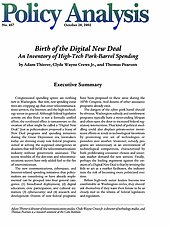Congressional spending sprees are nothing new in Washington. But now, new spending initiatives are cropping up that cover telecommunications services, the Internet, and the high technology sector in general. Although federal legislative activity on this front is not a formally unified effort, the combined effect is tantamount to the creation of what might be called a “Digital New Deal.” Just as policymakers proposed a litany of New Deal programs and spending initiatives during the Great Depression era, lawmakers today are devising many new federal programs aimed at solving the supposed emergencies or disasters that will befall the telecommunications industry without government assistance. The recent troubles of the dot-com and telecommunications sectors have only added fuel to the fire of interventionism.
The new communications, cyberspace, and Internet-related spending initiatives that policy-makers are considering or have already implemented can be grouped into four general categories: (1) broadband deployment; (2) digital education, civic participation, and cultural initiatives; (3) cybersecurity; and (4) research and development. Dozens of new federal programs have been proposed in these areas during the 107th Congress. And dozens of other assistance programs already exist.
The dangers of the cyber-pork barrel should be obvious. Washington subsidy and entitlement programs typically have a never-ending lifespan and often open the door to increased federal regulatory intervention. That kind of political meddling could also displace private-sector investment efforts or result in technological favoritism by promoting one set of technologies or providers over another. Moreover, subsidy programs are unnecessary in an environment of technological competition, characterized by both proliferating consumer choices and uncertain market demand for new services. Finally, perhaps the leading argument against the creation of a Digital New Deal is that by inviting the feds to act as a market facilitator, the industry runs the risk of becoming more politicized over time.
Before high-tech sector leaders become too comfortable in Washington circles, they should ask themselves if they want their future to be so closely tied to the whims of federal legislators and regulators.
About the Authors

This work is licensed under a Creative Commons Attribution-NonCommercial-ShareAlike 4.0 International License.
